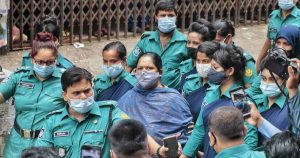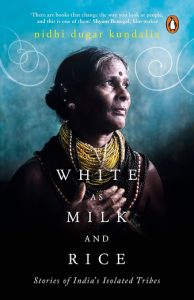Mahfuzur Rahman
Journalists always have to walk rough paths, no matter where they work. They face harassments even in sophisticated societies in one way or the other by dubious elements. They first want to buy journalists and then resort to coercive measures. When it comes to politics and journalism, there is also a love-and-hate relation between journalists and politicians. The opportunist politicians do not like the middle path – either be friends or get lost. And in the process, there grows a group which deceives people both politically and professionally.It is not only the politicians, there are also other vested groups that always try to use journalists or use them, and it largely goes either unnoticed or is ignored. But the fight between journalists and politicians, when it happens, takes the centre stage. There is nothing wrong if the two sides fight with each other for their own but genuine causes. But, there is of course a reason for people to be worried about if there is something fishy, obnoxious. Instances are not rare that journalists are subjected to harassment, repression, torture and killing. It happens everywhere, and Bangladesh is no exception.
The mass media in Bangladesh is now largely pluralistic, and things have started changing since the mid-‘90s, a time considered as a period of media boom. With the growing number of radio and television channels, the media landscape in Bangladesh has dramatically changed. Aiming to accelerate their business, the electronic media carried out various experiments focusing primarily on entertainment and then news, and investigative reports, while some others have been in the business with a mix bag. In a country where the literacy rate is still unsatisfactory, any news channel was not supposed to be popular. But, it has been proved wrong as people have showed more interest about news and views other than anything else.
For accommodating views and feedbacks, the newspapers have designated special pages and they gradually increased the number of such pages to reach out to a greater number of readers. But, what about the electronic media?
Capitalising on their potentials, the electronic media gradually introduced talk-shows. And that have been a huge hit! Like news and views, people here like another thing – politics. They like news and views because they like politics. Political news are said to be the most favourite globally, too.
As almost all the TV channels have started hosting talk-shows regularly, many little known political analysts, university teachers, political leaders and activists have become popular. There are many who are hardly known for their good pieces of write-ups but they have become good political analysts with their eloquence. The magic of electronic media is that it will make you known shortly as Khizr Khan in the USA. An unknown man until yesterday, he is now a familiar figure across the world, thanks to the media and also the politics. The strength of the media lies here. And this is how they invite admirations and criticisms — mostly criticisms.
In the past, there was little media bashing as we see these days, no matter how aggressive they were. And it was because of their limited outreach. Unlike the newspapers, the electronic media reach the all types of audience – the literate and the illiterate alike. Talk-shows on TV channels turned vastly popular ahead of the last general election held on January 5, 2014. We saw from heated debates to uglier fights in some of the talk-show programmes. Sometimes there were even badmouthing and fistfight-like episodes. The uglier the fight the greater virility will get your programme. Talk-show panelists, particularly politicians, were also seen slamming programme anchors raising questions about their wisdom. Do politicians fear journalists?
The problems of politicians with journalists are a bit tricky. There is always a sense of fear among politicians when it comes to journalism and journalists. It is nothing but the fear of disclosure, the fear of loss and the fear of breaking the nexus. A local politician over a decade back had brutally tortured a local journalist for daring to go against his unfair activities. Once a small reporter, he later became a big journalist enjoying a bigger platform at the national level. He has made his mark. He has made the best use of the opportunity that has come into his way. Now he is said to have got so many sources against militant outfits in the country, now no one can beat him in his area of work. When he writes he does justice to his assignment.
Due to its important role as a strong tool for social change, journalism is recognised as the ‘Fourth Estate’. It is the journalism that that can effectively help build a fair society. Journalism in Bangladesh has made a good progress both in quality and in the number of media outlets. It also embraced newer technologies fairly well, though there is a debate how it will look line in the future and whether the traditional media will be able to survive amid the challenge posed by the ever-growing social media. Such debates were also there over the existence of the broadsheet journalism when the electronic media made its mark in the media landscape decades back. Interestingly, the print media not only survived but also prospered in depth and dimension, particularly in South Asia.
The challenge now the traditional media is facing has a much deeper impact than the one it faced during the emergence of the electronic media because it is rapidly changing the market pattern. But the good thing is that the traditional media has so far responded well by trying to adapt to the changing situation and taken the social media as a supporting hand. These days, journalists are seen using every clue they get from the social media and are also sharing their own works through these informal platforms. This has been a wonderful coexistence.
But the problem remains for the masked politicians. Once they used to face only the traditional media journalists and now they have got the social media people around them to expose them raw. In mid July, an Indian political leader in Bihar caught on camera dancing with girls and making indecent gestures under the influence of the glass. This is now a painful stress for them. In recent years, many politicians here have to apologise for their unbecoming behaviour in public places. Now you are on minute-by-minute monitoring by journalists and social media users.
Politicians sharply react when they see their ruthless criticisms on the electronic media, and they talk about the ethics of journalism. What actually the ethics are! No civilised society can be built without ethics. Ethics should be everywhere. Ethics, in fact, are there everywhere. Ethics are also there in politics and business.
The relations between politicians and journalists are of paramount importance because both sides are supposed to build a fair society. While politicians work for the welfare of people, journalists are performing their professional duties by informing people that things are moving on as promised. And there is nothing wrong in bringing things in the lime light when they willfully renege on their commitments.
Any society should promote a political system where there will be thick-skinned and tolerant leaders who will be able to make decisions for the development of the country and welfare of its people, take criticisms amiably and never resort to reckless rhetoric. The people of this country also want the journalists to work on behalf of them without any compromise. As members of the ‘Fourth Estate’, journalists are at a great advantage. Play your cards right.
Source: UNB (Mahfuzur Rahman writes for the United News of Bangladesh)




